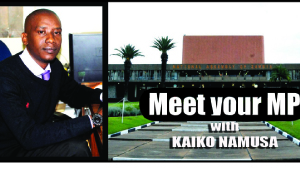 AT the pace developmental projects are taking root around the country, it is important to point out that the implementation process should not be delayed or hindered by any bureaucratic means.
AT the pace developmental projects are taking root around the country, it is important to point out that the implementation process should not be delayed or hindered by any bureaucratic means.
The process of development should be smooth and void of interruption, especially when resources are made available on a timely basis.
Parliament has been on recess since March, this year and the flock of members of Parliament, is now in their respective constituencies checking on progress in the implementation of various projects ranging from the road, health to the education sector.
Inside the week, your column has been in touch with most MPs who have indicated there unavailability to feature in this column for now, as they are committed in conducting tours of their areas.
Thus they cannot be blamed but it is worth noting that they are back with the people that voted them into office.
During the week, United Party for National Development (UPND) Sinjembela MP, Poniso Njeulu, lashed out at Ministry of Education officials, over the failure to release funds to construct schools in the constituency.
The impact of this development is that the construction of 10 schools in Sinjembela namely Sikatondo, Naliyo, Kanununu, Malala, Kwando, Matebele, Linkondwana, Nangweshi, Kalangola and Lyambo, has delayed.
Mr Njeulu, who is the Deputy Minister of Information and Broadcasting Services, said it was unacceptable for the district education board secretary and the provincial administration to allow more than K2 million released by government, to remain unutilised and kept in a bank from 2012 to date.
The DEBs in rendering an explanation said the delay to release the funds was being caused by delays in the tendering processes that were being handled by the provincial administration and in reaction that provincial administration accused the DEBs of being responsible for the delay.
In this scenario, the process of development is stagnant because of a ‘blame-game’ between the two offices, which is not in anyone’s interest.
What Zambians are interested in, is to see the wheels of development continue to roll as long as funds are available, which on government’s part, commitment has been exhibited to disburse the funds.
Mr Njeulu pinned that it was such an attitude exhibited by civil servants that portrayed a picture that the government was not performing.
He added that government officials should be efficient in delivering on government projects without being pushed to do so.
“I am instructing the provincial permanent secretary for Western Province to ensure that works on the said schools commence. There is no need for us to be keeping money which is meant for urgent projects of this nature,” he said.
Attitude and collective responsibility, is key to ensure that a country like Zambia continues on a sound path of development.
Civil servants have been reminded on several occasions to ensure that government programmes remain undisturbed.
It should be known that these projects are meant to benefit the country and not an individual, so delaying the process is a disservice to the people of Zambia.
If it is politics at play, let us realise that such attitudes hurt development and in turn hurt the people and poverty, unemployment would remain the a daily song.
The scenario in Sinjembela brings my attention to the utilisation of the Constituency Development Funds (CDF) in the 150 constituencies.
The amounts distributed are colossal and it is important that utilisation is for the benefit of the intended prescribers, the constituents in the respective areas.
Any delays in areas such as the tendering process, as is the case in Sinjembela, are very unnecessary and if at all, where it is dimmed fit, action should be taken against erring officers, as it is ‘criminal’ for an individual or a group of public workers to hold development to ransom and deliberately deny the Zambians, what is rightly theirs.
The highlights of the occurrence in Sinjembela, is a wake-up call for all MPs to keep a tab, on the goings-on in their constituencies to ensure that any unnecessary bureaucratic tendencies are avoided.
Development should be allowed to take place, so that Zambians can tackle poverty levels collectively. The pile of audit reports, published by the Auditor General Anna Chifungula and predecessors, reveal developments where funds had remained unutilised for various projects due to several excuses.
These are unnecessary hiccups that need to be rooted out, if development is to be attained in this country.
Kafue MP, Obvious Mwaliteta also echoed the significance of the civil service as the engine of effective implementation of government programmes.
Mr Mwaliteta, the Central Province Minister, said the civil service is critical to channel development to the grass-root.
He expressed concern and disappointment with the work culture of some civil servants and urged them to be professional and responsible in the execution of their duties.
“Civil servants are policy implementers. Civil servants are the engine of government. Without the civil servants, it is difficult for government to implement policies and programmes,” Mr Mwaliteta said, when he addressed some public service workers adding a call to avoid partisan politics.
Politics infiltrating the civil service, compromises performance, hence it has been emphasised that this category of workers need to work above politics but put national interest as a priority.
“You are civil servants and you have to work with the government of the day. As civil servants, you are not to engage in politics,” he added.
The highlights of today’s edition exemplifies the importance the civil service can play in driving development and that there are rules and guidelines that need to be adhered to, to ensure smooth implementation of developmental projects.






